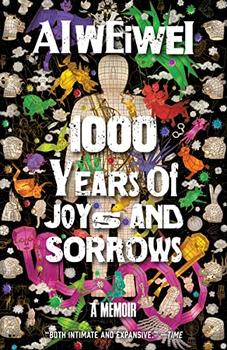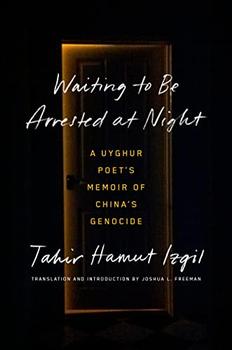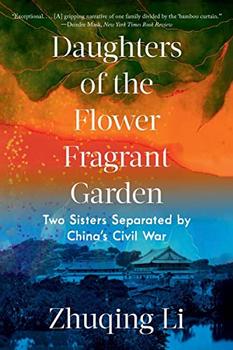Summary | Excerpt | Reviews | Beyond the book | Read-Alikes | Genres & Themes | Author Bio

Critics' Opinion:
Readers' Opinion:
First Published:
Nov 2021, 400 pages
Paperback:
Sep 2022, 400 pages
 Book Reviewed by:
Book Reviewed by:
Jennifer Hon Khalaf
Buy This Book
Ai Weiwei is such an influential and innovative artist and activist that a memoir focused purely on his life and works would have been interesting enough. 1000 Years of Joys and Sorrows is much more than that. It also chronicles a search for meaning as the author connects the intergenerational experiences of himself, his father and his son. Throughout the memoir, Ai Weiwei ruminates on the abstract meaning of art and human expression — and its place in society. Ultimately, he realizes that society and artistic individual expression are frequently (and perhaps fundamentally) at odds with one another — a revelation that was hard-won through his illegal detention as a political prisoner.
The memoir starts with Ai Weiwei's father, Ai Qing, a famous Chinese poet who, in spite of being initially favored by Chairman Mao, eventually faced instability and exile as he was branded a "rightist" in 1957 for criticizing the government. This continued through the Cultural Revolution due to the content of his poems and essays, and the other writers in his circle. Eventually, Ai Qing was allowed to return to society and his label as a rightist was officially "corrected" in 1979.
This is the foundation and background of Ai Weiwei's own journey, which he sees reflected in his father's rise and fall in fortune and favor. Growing up in exile resulted in a sense of rootlessness and defiance, and Ai Weiwei traveled to New York to study art in the 1980s, an opportunity that was newly available due to reforms in China following Mao's death in 1976. When he returned to China in 1993, he was vilified by the government for his art (see Beyond the Book). Ai Weiwei and Ai Qing's lives are connected and mirrored even though they lived through different eras. For both, the constant and steady act of self-expression inevitably results in societal and political reaction and control.
Sometimes considering what a person fails to acknowledge when telling their life story can be even more revealing of their inner truth. Ai Weiwei's memoir is incredibly expansive and compassionate, spanning topics such as animal rights, victims of natural disasters and the struggles of refugees. He sees complex humanity in diverse men, from successful Western artists to the rural Chinese prison guards who detained him. Yet there is a very glaring failure to recognize the significance of the women in his life, who are relegated to background supporting roles. His memoir focuses only on himself, his father and his son as the characters in his life that connect through a shared experience with the rest of the world.
At the same time, this doesn't detract from the profound truths that Ai Weiwei is able to share, gleaned from a life of pushing artistic and political boundaries. While he started off with more conventional forms of artistic expression, taking up painting as a boy, a turning point seems to have occurred with his introduction to Dadaism and conceptual art in New York City as a young man. This was the catalyst for his journey into realizing that all human expression and thought can become an artistic endeavor — which is why his works are so diverse and expansive. He has "destroyed" Han Dynasty Urns, created documentaries and a sanctuary for cats. Perhaps most beautifully, Ai Weiwei also arranged a largescale cultural exchange through "Fairytale," by having 1001 Chinese people travel to Kassel, Germany. This piece allowed the Chinese participants to experience the magic and growth involved in free international movement. (His documentary on this piece is available in full on YouTube.) Essentially, in creating constantly changing and diverse works, Ai Weiwei is continually exercising his fundamental drive and human right to expression — which eventually brought him at odds with the Chinese government.
We come to find that this book was born from Ai Weiwei's illegal detention and restriction of movement in 2011. On his way to Taipei, he was stopped at the airport and then secretly held in prison without due process, and placed under constant surveillance and interrogation for 81 days. There were a number of potential charges that were floated in front of him during the interrogation — such as subverting state power, disseminating pornography, economic crimes and art fraud. Ultimately, it becomes clear that the real crime is Ai Weiwei's voice. As his life has represented an evolution of artistic and human expression, it was perhaps inevitable that it would become politicized. Upon experiencing this fundamental truth about the nature of individual expression against a larger collective that seeks to maintain a status quo, Ai Weiwei comes to realize that his struggle is not unique or singular. Instead, it was foreshadowed by his father's endeavors a lifetime ago, and will likely be echoed by his son and many others to come.
![]() This review was originally published in The BookBrowse Review in January 2022, and has been updated for the
September 2022 edition.
Click here to go to this issue.
This review was originally published in The BookBrowse Review in January 2022, and has been updated for the
September 2022 edition.
Click here to go to this issue.

If you liked 1000 Years of Joys and Sorrows, try these:

Waiting to Be Arrested at Night
by Tahir Hamut Izgil
Published 2023
A poet's account of one of the world's most urgent humanitarian crises, and a harrowing tale of a family's escape from genocide

Daughters of the Flower Fragrant Garden
by Zhuqing Li
Published 2023
Sisters separated by war forge new identities as they are forced to choose between family, nation, and their own independence.





The Flower Sisters
by Michelle Collins Anderson
From the new Fannie Flagg of the Ozarks, a richly-woven story of family, forgiveness, and reinvention.

The House on Biscayne Bay
by Chanel Cleeton
As death stalks a gothic mansion in Miami, the lives of two women intertwine as the past and present collide.

The Funeral Cryer by Wenyan Lu
Debut novelist Wenyan Lu brings us this witty yet profound story about one woman's midlife reawakening in contemporary rural China.
Your guide toexceptional books
BookBrowse seeks out and recommends the best in contemporary fiction and nonfiction—books that not only engage and entertain but also deepen our understanding of ourselves and the world around us.